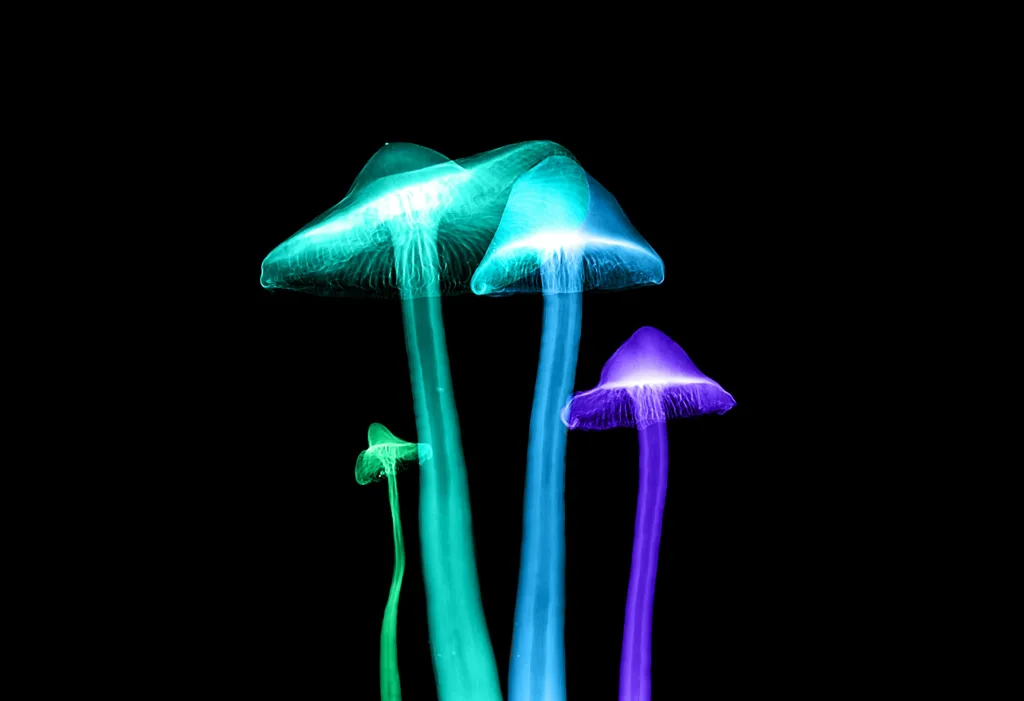In recent years, there has been a resurgence of interest in psychedelic-assisted therapy as a novel approach to treating various mental health conditions. Once dismissed and stigmatised, psychedelics such as psilocybin (magic mushrooms), MDMA, and LSD are now being researched for their potential therapeutic benefits in clinical settings.
This paradigm shift marks a new era in mental health treatment, offering hope to millions of individuals struggling with conditions such as depression, anxiety, PTSD, addiction, and more. In this article, we delve into the history, science, and current state of psychedelic-assisted therapy, exploring its potential to revolutionise the field of mental health.
The History of Psychedelic-Assisted Therapy:
The use of psychedelics for therapeutic purposes is not a new phenomenon. Indigenous cultures have utilised substances like peyote, ayahuasca, and psilocybin-containing mushrooms in healing rituals for centuries. However, it wasn’t until the mid-20th century that psychedelics gained attention in Western medicine. Pioneering researchers such as Dr. Humphry Osmond and Dr. Stanislav Grof conducted groundbreaking studies exploring the therapeutic potential of substances like LSD and MDMA. Initial findings were promising, suggesting that these compounds could facilitate profound insights, emotional breakthroughs, and therapeutic experiences when used in a controlled, supportive environment.
The Science Behind Psychedelic Therapy:
The therapeutic effects of psychedelics stem from their ability to alter perception, cognition, and consciousness by interacting with serotonin receptors in the brain. Psilocybin, for example, binds to serotonin receptors, particularly the 5-HT2A subtype, leading to changes in neural activity and connectivity. These alterations can result in a range of subjective experiences, including introspection, ego dissolution, and enhanced emotional processing. In the context of therapy, psychedelics are often administered in conjunction with psychotherapy sessions, where trained therapists guide and support individuals through their psychedelic experiences. The synergy between the drug’s effects and the therapeutic process can facilitate profound insights, emotional release, and lasting therapeutic benefits.
Current Research and Clinical Trials:
In recent years, there has been a resurgence of scientific interest in psychedelics, leading to a surge in research studies and clinical trials exploring their therapeutic potential. Organizations such as the Multidisciplinary Association for Psychedelic Studies (MAPS) and the Imperial College London’s Centre for Psychedelic Research are at the forefront of this research endeavor. Clinical trials investigating the use of MDMA-assisted therapy for PTSD, psilocybin-assisted therapy for depression, and LSD-assisted therapy for addiction have shown promising results, with many participants experiencing significant symptom reduction and long-term improvements in mental well-being. These findings have spurred further research and fueled calls for the rescheduling of psychedelics to facilitate expanded access for therapeutic use.
Spiritual connection
Spirituality plays a significant role in psychedelic-assisted therapy, serving as a cornerstone for many individuals’ healing journeys. Psychedelic experiences often evoke profound spiritual or mystical insights, leading to a sense of interconnectedness, transcendence, and existential meaning. Many participants report encountering archetypal symbols, experiencing a sense of unity with the universe, or undergoing transformative spiritual awakenings during their psychedelic sessions. This spiritual dimension can deepen the therapeutic process, providing individuals with a framework for understanding their experiences, integrating insights, and cultivating a greater sense of purpose and well-being in their lives.
Challenges and Considerations:
Despite the growing enthusiasm surrounding psychedelic therapy, several challenges and considerations remain. Regulatory hurdles, stigma, and misconceptions about psychedelics pose barriers to mainstream acceptance and integration into clinical practice. Moreover, the psychedelic experience can be intense and unpredictable, requiring careful preparation and integration support to ensure safety and maximise therapeutic benefits. Additionally, more research is needed to elucidate the mechanisms of action, optimal dosing regimens, and long-term effects of psychedelic therapy across different populations and mental health conditions.
The Future of Psychedelic-Assisted Therapy:
Despite the challenges, the future of psychedelic-assisted therapy appears promising. As research continues to accumulate, there is growing recognition of the potential of psychedelics to transform mental health care. Efforts to destigmatise psychedelics, educate healthcare professionals, and advocate for policy reform are gaining momentum, paving the way for greater acceptance and integration into mainstream medicine. With ongoing clinical trials, expanded access initiatives, and a burgeoning community of researchers, therapists, and advocates, psychedelic therapy is poised to revolutionise the field of mental health, offering new hope and healing for those in need.
Conclusion:
In conclusion, psychedelic-assisted therapy represents a transformative approach to mental health treatment that integrates cutting-edge science with ancient wisdom and spirituality. Grounded in a rich history of indigenous healing practices and bolstered by rigorous scientific research, psychedelic therapy offers new hope and healing for individuals struggling with mental health conditions. As societal attitudes evolve and research advances, the integration of psychedelics into mainstream medicine holds the promise of revolutionising mental health care, offering a holistic path to healing, transformation, and spiritual growth for those in need. By embracing the therapeutic potential of psychedelics and honouring the spiritual dimensions of the healing journey, we can usher in a new era of mental health care that addresses the profound complexities of the human psyche and fosters greater well-being and flourishing for individuals and communities alike.
